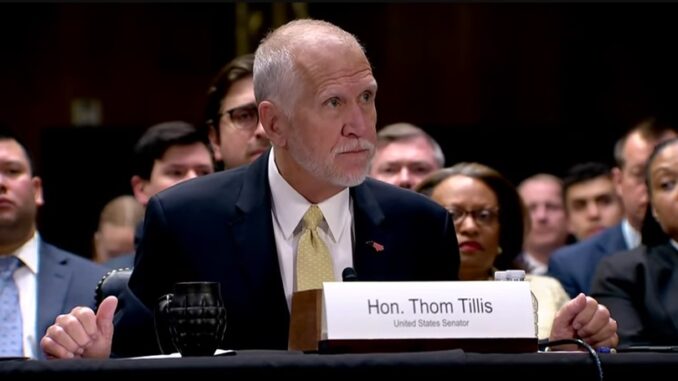
RALEIGH — North Carolina’s Congressional delegation has been pressing the Biden administration for additional funding relief in the wake of Hurricane Helene.
North Carolina’s two Republican senators, and Thom Tillis, and Congressman Chuck Edwards (R-N.C.) led a bipartisan group of lawmakers from both chambers in a Nov. 15 letter to President Joe Biden requesting expedited supplemental funds for the relief efforts.
Biden then submitted an additional funding request to Speaker of the House Mike Johnson (R-La.) earlier this week. Biden’s request comes close to $100 billion, and around $40 billion of that total would go to resupply the Federal Emergency Management Agency’s (FEMA) relief fund.
During a Senate Appropriations Committee hearing on Wednesday, Tillis described the devastation in North Carolina and outlined the urgent need for Congress to quickly release the $100 billion in supplemental funding recommended by the Office of Budget and Management.
“One hundred five lives lost; 151,000 homes destroyed; 500,000 businesses affected in disaster-declared areas; 5,000 miles of roads, including almost five miles of I-40 damaged and impassable for likely a couple of years,” Tillis said in his testimony. “1,300 public bridges and culverts damaged; 163 water and sewer systems damaged; 20,000 farms in disaster-declared counties with $3.4 billion in damages.”
Tillis told the committee that North Carolina’s hurricane victims “don’t need tears. They need action.”
More than 220 people died across six states as the result of Hurricane Helene, with North Carolina enduring the most fatalities. The N.C. Department of Health and Human Services puts the Hurricane Helene death toll in the state at 103 as of Nov. 21.
FEMA Administrator Deanne Criswell also gave testimony at the hearing, which in part confirmed that FEMA is almost out of money. Criswell said that as of Oct. 1, there was $22 billion in FEMA’s Disaster Relief Fund (DRF), but a month later, that balance was depleted by more than 75%.
“As of Nov. 14, 2024, the DRF balance is $5.4 billion, which falls short of providing sufficient funding resources the agency needs in FY 2025 to provide the continued lifesaving, life-sustaining resources our citizens deserve,” Criswell said. She added she was fully supporting the Biden administration’s $39 billion request to add to the DRF.
The same day as the Senate Appropriations Committee hearing, North Carolina Gov. Roy Cooper traveled to Washington, D.C., to press for his $25.57 billion proposal for additional funds needed for recovery in North Carolina. That proposal was first sent to Biden, President-elect Donald Trump and appropriations leaders in both chambers of Congress on Nov. 14.
Cooper’s 46-page proposal requests include:
- $7.41 billion from the U.S. Department of Transportation and FEMA for transportation needs, including rebuilding and repairing interstates, highways, state and municipal roads and bridges, railroad tracks, general aviation airports and more.
- Almost $6 billion from the U.S. Department of Housing and Urban Development for housing recovery, economic revitalization, water quality and infrastructure, rebuilding private roads and bridges and more.
- $1.75 billion from the Federal Emergency Management Agency for the Community Disaster Loan Program.
- $1.67 billion from the U.S. Department of Agriculture for crop and timber loss relief, watershed protections, conservation, forest restorations, rural water and waste disposal and more.
- $1.23 billion from the Small Business Administration from the Home and Personal Property Disaster Loan Program, and loans covering physical damage and economic injury.
According to the governor’s office, more than $244 million in FEMA Individual Assistance funds has been paid to victims with over 260,000 people registered for help to date. Additionally, more than 6,000 applications have been filed for Small Business Administration Loan aid.
Including the most recent Helene relief package passed, the N.C. General Assembly has issued $1.1 billion in hurricane-related aid for western North Carolina.
Recent reports of FEMA aid workers bypassing homes of Trump supporters in states affected by Hurricanes Helene and Milton were the subject of a Nov. 19 House Committee on Oversight and Accountability in a hearing.
Lawmakers grilled Criswell over evidence indicating the problem went beyond just one employee, which included text messages from the fired employee as well as information from a FEMA whistleblower.
At least one employee, FEMA supervisor Marn’i Washington, has been fired over the incident. Washington has since claimed that avoiding homes of Trump supporters was an agency-wide policy.
“Why should we believe this is an isolated incident?” Rep. James Comer (R-KY), chairman of the House Oversight Committee, asked Criswell.
Criswell denied it was a customary practice and said FEMA has asked the inspector general to investigate.
“We are conducting an investigation, and we have asked the IG to look into this further to ensure that this is not beyond the one employee who sent this message,” Criswell said. “It is not indicative of the rest of our workforce and it is completely unacceptable.”
At least one state is suing FEMA over the incident. Florida Attorney General Ashley Moody filed a lawsuit on Nov. 13, naming Criswell and Washington as defendants.
The same day as the House Oversight hearing, Tillis and Budd, along with 17 members of the Senate, sent a letter to FCriswell demanding answers, documents, and more about the agency’s bypassing homes of Trump supporters.



